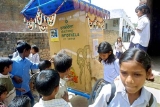Bicycle rickshaws with a difference are a feature of the roads of Uttar Pradesh, India, this year. The rickshaws are part of a project called Infothela (or info-cart) conceived in 2003 by the Indian Institute of Technology in Kanpur. They carry a computer with a high-speed, wireless Internet and aim to use technology to improve education, health care and access to agricultural information in India’s villages.

India has a relatively small power grid and many villages still have no access to electricity. As a consequence the country has one of the world’s lowest Internet usage rates — only 12 computers and four Internet connections per 1,000 people — and much of rural India are just forgotten by technology.
The equipment on Infothela riskshaws has been designed not to rely on electricity at all and is powered by a battery charged by pedaling.
One cart goes round villages providing free computer classes, teaching the basics of computing, word processing, spreadsheets, Internet browsing and Web cameras. The villages all lie within a 50-mile wireless corridor linked by high-rise Wi-Fi antennae and amplifiers, which was created for the project.
Another Infothela rickshaw is providing expert medical advice and diagnosis to remote villages through video-conferencing, and a third cart giving information about crop prices and farming techniques will be on the road soon.